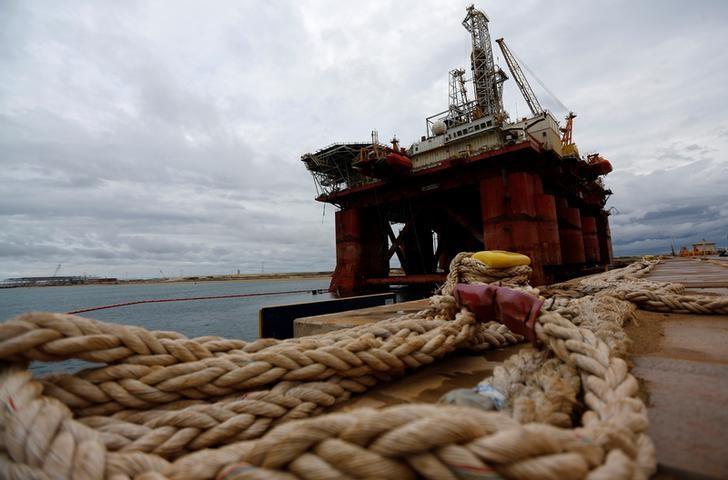
UNDERINVESTMENT OIL

According to WSJ, In June, oil giant BP PLC announced what it deemed an "important" new discovery in Egypt.
It turned out to be a modest natural-gas find that didn't even rank in the top 50 discoveries since 2012. The fact that BP and its partner Eni SpA hailed it as a major success is a sign of the times for the oil industry.
For years, big oil and gas companies poured ballooning sums into seeking mammoth reserves in difficult locations. But their recent record was spotty, and a dearth of major finds was followed by the oil-price slump that began in 2014. It prompted companies to cut costs and shift away from expensive, high-risk exploration.
World-wide, oil-exploration spending last year was the lowest since 2007. There's been less conventional oil and gas (as opposed to resources contained in shale or oil sands) discovered in the past 2½ years than in 2012 alone, according to Edinburgh-based consultancy Wood Mackenzie.
And oil companies will likely show continued pressure on exploration budgets when they report their third-quarter earnings over the coming week, say analysts.
Some in the industry say the decline in exploration spending will eventually contribute to an oil drought—and spiking crude prices. Saudi Arabia's energy minister Khalid al-Falih told an oil conference in London this month that the underinvestment caused by weak oil prices over the past two years will result in "a period of shortage of supply."
Others say it is the new normal, in which giants like BP and Royal Dutch Shell PLC will increasingly focus their exploration on less risky and more easily accessible reserves—and spend some of the money they used to use for exploration to buy already-discovered resources from smaller companies.
Today's frugal period comes after oil companies boosted exploration spending in the 2000s amid high prices and rising Asian demand.
Drilling tested fresh ocean depths and under Arctic ice in a search for new barrels, as output from easy-to-reach fields declined.
But as spending increased, success didn't. Leaving aside unconventional resources, annual volumes of oil and gas discovered have declined successively since 2010, according to data from Wood Mackenzie.
While big companies were drilling dry holes, small companies pumped increasing amounts of shale oil, which helped spark the 2014 oil-price crash.
Big companies responded with big cuts. BP, Eni and their peers cut exploration spending by 35% in 2015 compared with 2013, Wood Mackenzie's data show. Many projects now focus on lower-risk, lower-reward prospects as companies hope for incremental gains near existing infrastructure that they can bring online quickly and cheaply.
"We have pared back exploration and are focusing our efforts on adding barrels with short-cycle time," BP's head of exploration and production Bernard Looney said in a presentation earlier this year published on the company's website.
BP has cut exploration spending from $3.5 billion in 2013 to around $1 billion this year. And Eni—one of the past decade's most successful big explorers—has a target to discover 1.6 billion barrels between 2016 and 2019 at a cost of $2.30 a barrel. That comes after Eni found 11.9 billion barrels at a unit cost of $1.20 per barrel over the past eight years.
It is a major shift for big oil companies that designed their exploration strategies to find enough conventional oil and gas to replace all the barrels they pump every year, says Andrew Latham, Wood Mackenzie's vice president of exploration research.
Now, their conventional exploration seems "designed to add about 50%" of what they produce, forcing them to rely on unconventional resources like shale and acquisitions of other companies' resources to maintain output, Mr. Latham said.
Shell, for example, bought BG Group for roughly $50 billion earlier this year, refilling its reserves. It also cut its exploration budget in half this year, retreating from Alaska's Arctic after drilling one of the most expensive dry holes of 2015.
Now "we rely less on exploration," Shell's Chief Financial Officer Simon Henry said in June.
There have been isolated big finds in recent years. Eni last year discovered giant gas reserves off Egypt and Exxon found oil off Guyana. But the big companies have increasingly opted for smaller projects.
Wood Mackenzie says that despite the big cost cuts, the number of exploration wells completed last year fell by only 11% compared with the average of the last four years. That is because companies are drilling more efficient wells aimed at more modest, low-risk gains, rather than big, risky ones in new provinces, Wood Mackenzie says.
Shell's exploration chief, Ceri Powell, said the company has lowered the average time it takes to start production from a new discovery near existing infrastructure from 18 months two years ago to less than 12 months now.
"Some frontier exploration near infrastructure is acceptable, but really big, long-term infrastructure, deep water frontier is probably not on the cards for us," BP CEO Bob Dudley said last week.
Earlier this month, BP walked away from a major exploration prospect offshore Australia following pushback from environmental activists. The company cited budget constraints.
-----
Earlier:







